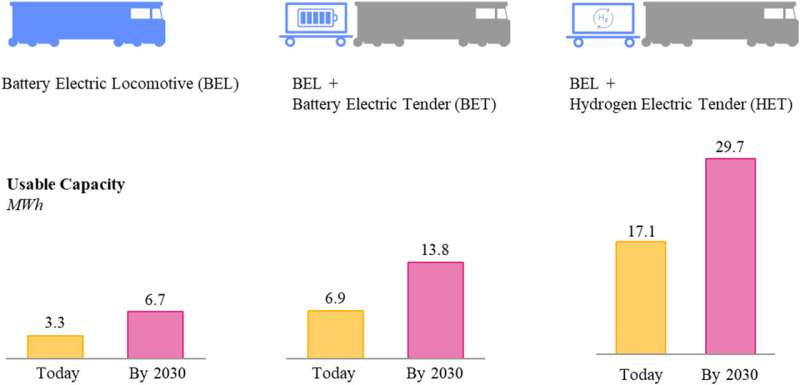This article has been reviewed according to Science X's editorial process and policies. Editors have highlighted the following attributes while ensuring the content's credibility:
fact-checked
trusted source
proofread
Charging toward a more sustainable heavy rail network

University of Queensland researchers have worked with industry to map how Australia could move towards decarbonizing its heavy haulage rail network.
Dr. Ruth Knibbe and Professor Paul Meehan from UQ's School of Mechanical and Mining Engineering collaborated with rail freight operator Aurizon to analyze rail corridors across Australia, and found batteries—or a combination of batteries and hydrogen fuel cells—could feasibly replace diesel power on those routes. Their paper is published in Journal of Energy Storage.
Dr. Knibbe said there was real opportunity for Australia to decarbonize heavy rail in the coming decade.
"Rail transport accounted for about 3 percent of global carbon emissions in 2020, so decarbonizing railways will play a major part in Australia's transition to renewables," Dr. Knibbe said.
"But it's challenging, with long rail routes across the country that require a lot of energy and limited capacity to set up recharging infrastructure, which means all energy needs to be transported on board."
The study looked at the weight of trains and how much energy would be needed to transport full loads between mines and ports, and options such as dynamic braking that generates energy when a train goes downhill or slows.
"While heavy duty batteries present huge opportunities by allowing for braking energy to be captured, it's also a major challenge to keep them cool," Dr. Knibbe said.
"Conceptually the batteries on board weigh around 42 tons and need to be kept at safe temperatures and prevented from degrading prematurely.
"We assessed both energy and cooling requirements of each rail route, as well the energy storage systems available."
The researchers found battery-operated trains could replace diesel locomotives on shorter, low energy routes such as the 200-kilometer Gladstone to Moura corridor in Central Queensland.
"For higher energy routes such as the 1,000-kilometer Townsville to Mt Isa corridor in the state's northwest, we found a battery-operated train with a hydrogen fuel cell would be more suitable, with around 32% of the energy able to be regenerated during a journey," Dr. Knibbe said.
"It's important to note that as battery and fuel cell technology progresses, the energy that can be packed into the locomotives will be even greater."
"Furthermore, with projections of decreased battery and fuel cell costs over the coming years, the economic case for decarbonized heavy haul rail looks even better."
Aurizon's Fleet Decarbonization Manager Roger Buckley said the UQ research was a crucial piece of work in Aurizon's drive to reduce carbon emissions across the company's locomotive fleet.
"We are committed to building a more sustainable future and have a sharp focus on our goal to further reduce Aurizon's carbon footprint as we work towards zero operational emissions by 2050," Mr. Buckley said.
"Highly efficient freight trains powered by renewable energy will be a key enabler in decarbonizing Australian supply chains and delivering major safety, economic and environmental benefits for customers, the economy and the general community."
More information: Ruth Knibbe et al, Application and limitations of batteries and hydrogen in heavy haul rail using Australian case studies, Journal of Energy Storage (2022). DOI: 10.1016/j.est.2022.105813

















